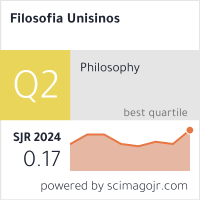On the philosophical foundations of episodic memory as awareness of past events
DOI:
https://doi.org/10.4013/fsu.2018.191.07Resumen
Mental time travel (MTT) is quite a novel label in Philosophy. The notion was set by experimental psychologist and cognitive neuroscientist Endel Tulving in the 1980s and refers to the ability to be aware of subjective past and future events. Tulving’s view on memory and consciousness provides an important conceptual distinction founded in experimentally observed data. In this paper I discuss (1) his concept of episodic memory as awareness, based on Peter Hacker’s distinction of perception and sensation, and his account of memory, and (2) whether memory can be taken as an own-body subjective perception, which, therefore, challenges the conception of memory as stored information in the brain and the idea that we could somehow perceive our memories. The main puzzle is: if awareness is a conscious state that involves veridical perception of present inner or outer states/events, how can we conceive awareness of past and future events? This discussion aims to contribute to Tulving’s conception of MTT by clarifying the conceptual foundations on which we can understand memory.
Keywords: memory, episodic memory, awareness, private experiences.
Descargas
Descargas
Publicado
Cómo citar
Número
Sección
Licencia
Concedo a revista Filosofia Unisinos – Unisinos Journal of Philosophy o direito de primeira publicação da versão revisada do meu artigo, licenciado sob a Licença Creative Commons Attribution 4.0 (que permite o compartilhamento do trabalho com reconhecimento da autoria e publicação inicial nesta revista).
Afirmo ainda que meu artigo não está sendo submetido a outra publicação e não foi publicado na íntegra em outro periódico e assumo total responsabilidade por sua originalidade, podendo incidir sobre mim eventuais encargos decorrentes de reivindicação, por parte de terceiros, em relação à autoria do mesmo.










